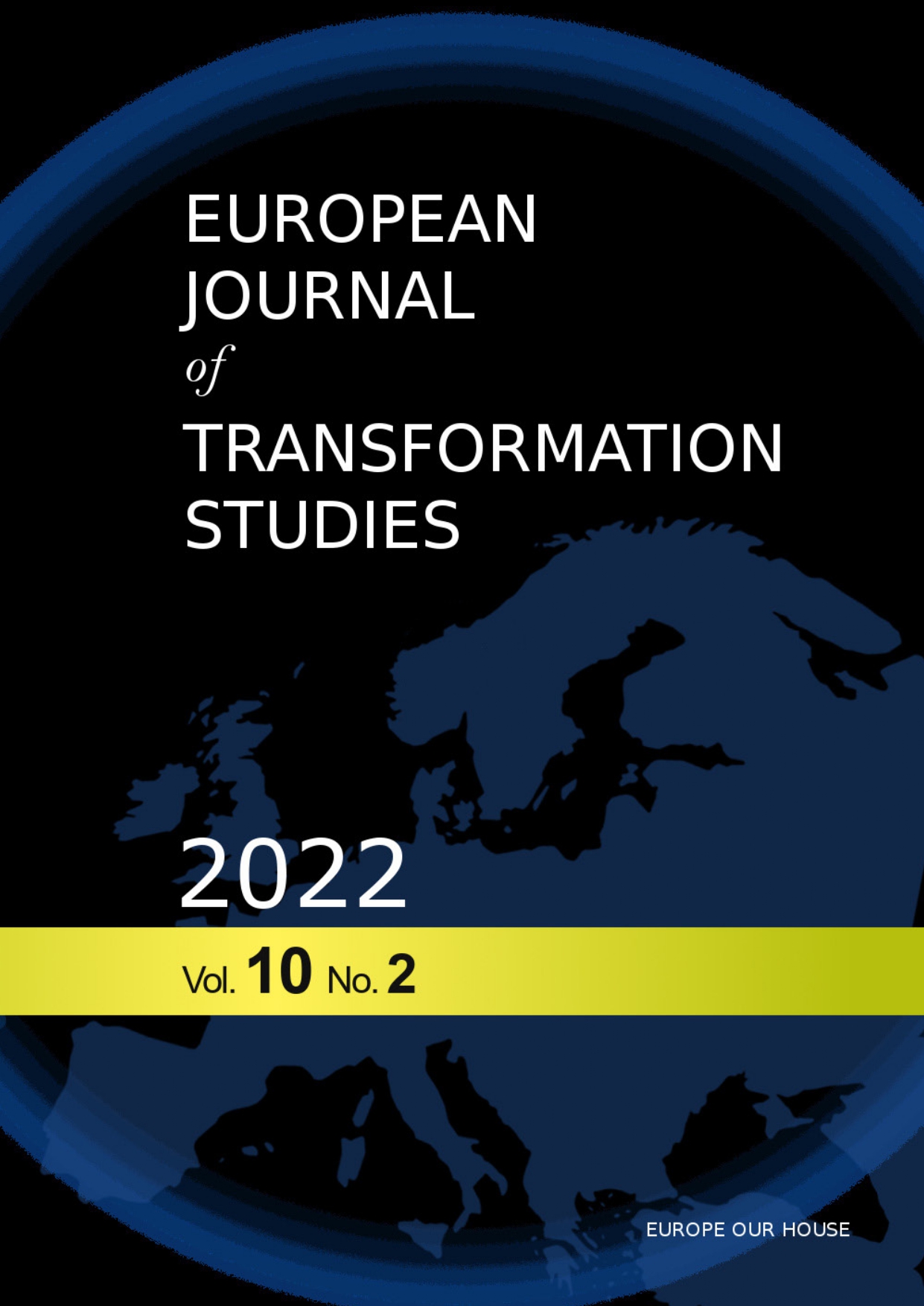Collaborative platforms as alternative players of global politics: Ukraine Defense Contact Group and Kyiv Security Compact 2022
Słowa kluczowe:
Collaborative Platfor, Security, Collaboration, RammsteinAbstrakt
In the article, the author considers the possibility of new global actors in the context of rethinking security architecture. Using G. Grevi’s interpolarity approach and the “thousand plateaus” concept by J. Deleuze and F. Guattari, the researcher forms a theoretical basis for the categories of the collaborative window and collaborative platform. The author offers her vision of the external and internal structure of the collaborative platform as a transnational interactive place for joint actions. Applying the case study, the researcher considers the Ukraine Defense Contact Group as a kind of prototype of a collaborative platform, while the Kyiv Security Compact is the legal basis of a collective security institution.
Downloads
Bibliografia
Aliyev, H., (2016), Strong militias, weak states and armed violence: towards a theory of ‘state-parallel’ paramilitaries, Security Dialogue, 47:6, 498–516.
Ansell, C., Gash, A., (2008), Collaborative governance in theory and practice, Journal of Public Administration Research and Theory 18, 4, 543–71.
Ansell, C., Gash, A., (2018), Collaborative Platforms as a Governance Strategy, Journal of Public Administration Research and Theory 28(1):1-17.
Ansell, C., Sørensen, E., & Torfing, J., (2017), Improving Policy Implementation through Collaborative Policymaking, Policy and Politics, Vol. 45, No. 3, pp. 467-486.
Bentrup G., (2001), Evaluation of a Collaborative Model: A Case Study Analysis of Watershed Planning in the Intermountain West, Environmental Management 27(5):739-48.
Bonacich, P., (1987), Power and Centrality: A Family of Measures, The American Journal of Sociology, Vol. 92, No. 5, pp. 1170-1182.
Borghard, D., (2014), Friends with Benefits? Power and Influence in Proxy Warfare. Thesis (PhD) Columbia University.
Borys, J. M., Y. Le Bodo, S. A. Jebb, J. C. Seidell, C. Summerbell, D. Richard, S. De Henauw, et al. (2012), EPODE approach for childhood obesity prevention: Methods, progress and international development. Obesity Reviews 13:299–315.
Bouchard, C, Peterson, J. and Tocci, N., (2013), Multilateralism in the 21st century: Europe’s quest for effectiveness, London: Routledge.
Ciborra, C., (1996), The platform organization: Recombining strategies, structures, and surprises. Organization Science 7:103–18.
Deleuze, J. & Guattari, F., (1980), Capitalism and schizophrenia. Book 2. A Thousand Plateaus. Retrieved from https://www.rulit.me/books/kapitalizm-i-shizofreniya-kniga-2-tysyacha-plato-read-250949-1.html (In Russian)
Grevi, G., (2009), The Interpolar World. A New Scenario. Paris: European Union Institute for Security Studies. EUISS Occasional Paper No. 79.
Hughes, G., (2012), My enemy’s enemy: proxy warfare in international politics. Eastbourne: Sussex Academic Press.
Hughes, G. & Tripodi, C., (2009), Anatomy of a surrogate: historical precedents and implications for contemporary counter-insurgency and counter-terrorism, Small Wars & Insurgencies, 20:1, 1–35.
Huntington, S., (1999), The lonely super power. Foreign Affairs 78(2): 35–49.
Huxham, C., (2003), Theorizing collaboration practice. Public Management Review 5:401–23.
Kingdon, J., (1995), Agendas, alternatives, and public policies (2nd ed.). Boston: Little, Brown.
Kramer, A. We Heard It, We Saw It, Then We Opened Fire. The New York Times. – Online at: https://www.nytimes.com/2022/10/23/world/europe/ukraine-russia-drones-iran.html
Kyiv Security Compact. Online at: https://www.president.gov.ua/storage/j-files-storage/01/15/89/41fd0ec2d72259a561313370cee1be6e_1663050954.pdf
Leeds, B., et al. (2002), Alliance Treaty Obligations and Provisions, 1815-1944. International Interactions: Empirical and Theoretical Research in International Relations, 28 (3), 237–260. doi:10.1080/03050620213653
Lober, D., (1997), Explaining the formation of business-environmentalist collaborations: Collaborative windows and the Paper Task Force. Policy Sciences, 30, pp. 1-24.
Rankin J. How soulmates Hungary and Poland fell out over Ukraine war. The Guardian. – Online at: https://www.theguardian.com/world/2022/oct/18/how-soulmates-hungary-andpoland-fell-out-over-ukraine-war
Rauta, V., (2016), Proxy agents, auxiliary forces, and sovereign defection: assessing the outcomes of using non-state actors in civil conflicts. Southeast European and Black Sea Studies, 16 (1), 91–111. doi:10.1080/14683857.2016.1148416
Rauta, V., (2019), Towards a typology of non-state actors in ‘hybrid warfare’: proxy, auxiliary, surrogate and affiliated forces Cambridge Review of International Affairs, DOI: 10.1080/09557571.2019.1656600
Renard, T., (2009), A BRIC in the world: Emerging powers, Europe, and the coming order. Brussels: Egmont-Royal Institute for International Relations. 46 p.
Sabatier, P., Hunter, S. and McLaughlin, S., (1987), The Devil Shift: Perceptions and Misperceptions of Opponents, The Western Political Quarterly, Vol. 40, No. 3, pp. 449–476.
Salem, H., (2014), ‘Ukraine: night Wolves and unidentified military men seize key Crimea sites’, The Guardian, 28 February.
Salem, H., & Walker, S., (2014), ‘Kiev announces plans to withdraw Ukrainian troops from Crimea’, The Guardian, 19 March.
The USA will announce a new $600 million military aid package for Ukraine. Military media. – Online at: https://mil.in.ua/en/news/the-usa-will-announce-a-new-600-million-militaryaid-package-for-ukraine-media/
Tella, O., (2015) Polarity in contemporary international politics: a uni-interpolar order? Politeia 34:4-23.
Thomas, L. D., E. Autio, and Gann D., (2014), Architectural leverage: Putting platforms in context. The Academy of Management Perspectives 28:198–219.
Thomas, C., & Koontz, T., (2012), Measuring the Performance of Public-Private Partnerships: A Systematic Method for Distinguishing Outputs from Outcomes, Public Performance & Management Review 35(4):769-786.
Wehrey, F., (2014), Is Libya a Proxy War? The Washington Post. 24 October.
Weiss, M., (2015), Crowdfunding the war in Ukraine – from Manhattan, Foreign Policy, 04 February.

 Uniwersyteckie Czasopisma Naukowe
Uniwersyteckie Czasopisma Naukowe



